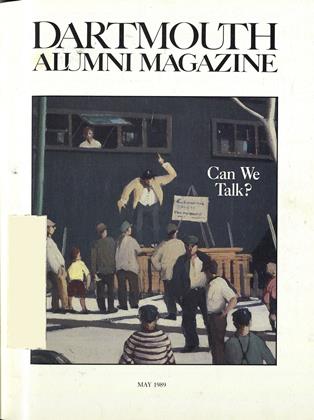For an hour each Monday evening I entertain myself by facing a crowd of some 70 people, including students, faculty and people from the Upper Valley, in a Rockefeller Center amphitheatre. On one such night I am flanked by Religion Professor Ron Green and by James Garrett '88, the self-styled "social critic" of the Dartmouth Review. I hold the gavel in a debate titled, "Hippies or Yuppies: Were the Sixties Better than the Eighties?"
It is the thirteenth weekly debate sponsored by the Dartmouth Union, a new organization that fosters lively (and sometimes raucous) public conversation. After a short introduction by me on the Union's principles of civility and high-flown argumentation, Professor Green begins his oration in support of the sixties, "If you select the criteria of outward tranquility and stability, then the eighties have it hands down," he says. "But if any other criteria are used, the sixties win."
Professor Green is obviously having a good time, and so are the members of the audience, who may speak after the two debaters. This kind of event is rare at Dartmouth—or at any other college campus—where students are deeply divided among ideologies. But when the Dartmouth Union was formed last February (with Policy Studies Professor Doug Yates, a former Rhodes Scholar, as advisor), it was not intended to persuade anybody. We have two basic purposes: to hone our rhetorical knives, and to have a good time.
The weekly forum provides a kind of campus goldfish bowl in which students test themselves in public argument, debating such subjects as, Should Dartmouth Be More Intellectual? Does the CIA Promote American Values? Should the United States Annex Canada? When you have 70 eager faces staring at you, it provides epiphanies. The faces are eager because they are ready to make a fool of you at the slightest provocation.
Professor Green has just begun his paean for the sixties when he interrupts himself. "Forgive me while I get into character," he says, and he doffs his tweed jacket, silk tie and starched shirt to expose a wildly colored tiedyed tee shirt and a crystal necklace. He concludes that his favorite decade was a "utopian and special moment" that occurs once or twice a century.
But Professor Green is not yet done. He plays an old Beatles song on a record player. "All you need is love," the song says. "Love, love, love is all you need." When the music finally stops, I say, "Mr. James Garrett will now show that supply side economics is all you need."
"I come to bury the sixties, them," Garrett trumpets. He argues Professor Green's undressing reveals a vintage-sixties preference stance. concludes by summing up the eighties' ress, achievement, and a Gold Card."
I wish all the debates went this smoothly. One of our earliest topics, the one on the U.S. Annexing Canada, drew more than a dozen angry Canadians who put a damper on the conversation. Even at the conclusion of each debate, when people vote by their choice of exit, there's a tension between whether they agree with the proposition or simply prefer a debater's argument.
The debate over the sixties is a rare case in which the student's side of the argument wins the audience's favor. Ron Green ends his summation, "I challenge you who defend the eighties: what are you doing for the future?" James Garrett, in turn, has a rhetorical question of his own: "Would you feel comfortable in an age where the initials 'VCR' are not known?"
The audience answers by leaving, in a two-to-one margin, out the door for the eighties.
Senior Ron Lepinskas is a history major.
 View Full Issue
View Full Issue
More From This Issue
-
 Feature
FeatureWhen Dialogue Turns to Diatribe
May 1989 By Larry Martz '54 -
 Feature
FeatureDartmouth's Competitive Niche
May 1989 By Mahlon Apgar IV '62 -
 Feature
FeatureLet's Start a Genuine Discussion About Our College
May 1989 By George Munroe '43 -
 Cover Story
Cover StoryCAN WE TALK?
May 1989 By Jay Heinrichs -
 Article
ArticleREVIEW LOSES SUIT
May 1989 -
 Article
ArticleSTARSTRUCK
May 1989 By Gary Wegner
Features
-
 Feature
FeatureCOMMENCEMENT 1965
JULY 1965 -
 Feature
FeatureAlumni Awards
JULY 1972 -
 Cover Story
Cover StoryThe Library Culture
December 1992 -
 Feature
FeatureNotebook
Mar/Apr 2007 -
 Cover Story
Cover Story"It Hasn't Been Commercialized"
Mar/Apr 2009 -
 Feature
FeatureNew Environmental Studies Program To Be Launched in the Fall
JUNE 1970 By ROBERT B. GRAHAM '40

